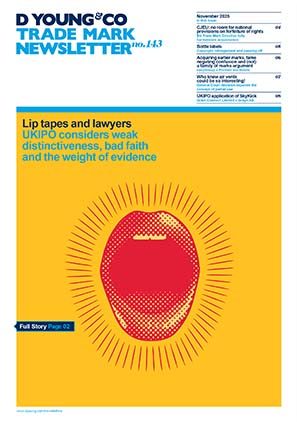Are all book titles equal? Animal Farm and EUIPO doublespeak
Case R 1719/2019-5 concerning an attempt to register ANIMAL FARM at the EUIPO points out inconsistencies in the EUIPO’s decisions regarding the registrability of titles of famous literary works as trade marks.
The contested decision
The Estate of the Late Sonia Brownell Orwell, George Orwell’s second wife and a fierce protector of his literary legacy, sought to register the mark ANIMAL FARM for various goods and services in classes 9, 16, 28 and 41, including movies, books, toys, entertainment, cultural activities and educational services.
Initially, the examiner at the EUIPO partially refused the application pursuant to Articles 7(1)(b), 7(1)(c) and 7(2) of the EU Trade Mark Regulation, arguing that the mark refers to the title of a renowned artistic work and would be perceived by the public as such. Consequently, the mark would not serve as an indication of the commercial origin of the goods and services at issue.
The applicant appealed, seeking an annulment of the contested decision and pointing to the Anne Frank decision (case R 2401/2014-4, Le Journal d’Anne Frank). In that case, the trade mark had proceeded to registration; the applicant argued that it was analogous to the ANIMAL FARM mark since it also referred to a well-known literary work.
The EUIPO’s track record
The Board of Appeal noted that the EUIPO has issued several diverging decisions regarding the registrability of book titles and names of characters of artistic works, particularly in relation to the above-mentioned goods and services in classes 9, 16, 28 and 41. The Board of Appeal discussed how in some of those cases a title could be seen as an indicator of source, whereas in others it could render a mark descriptive and non-distinctive. The following cases were listed to highlight the issue:
- The Jungle Book (R 118/2014-1) and Pinocchio (R 1856/2013-2): the EUIPO ruled that trade marks which consist solely of titles of books that have undergone many film and theatre adaptations reaching large audiences are usually not distinctive, particularly in the context of goods and services which could have that story as their subject matter.
- Frühlingsfest der Volksmusik (R 670/2005-1): a title of an event without further distinctive elements was considered devoid of distinctive character.
- Winnetou (R 1297/2016-2): the sign was descriptive and non-distinctive because, apart from signifying a famous invented figure, it acquired an additional abstract meaning as a reference to an honourable Native American.
- Le Journal d’Anne Frank: although the story of Anne Frank is widely known and popular among the public, it was not considered descriptive of goods and services in classes 9, 16 and 41. The mark identified the producer of the goods and services, and the Board of Appeal stated that the repute of a title does not in itself constitute a barrier to registrability.
- Der Kleine Hey (R 881/2014-5): the EUIPO ruled that the title of a book does not prima facie inform of the subject matter of a publication except if it has developed in the understanding of the public into a general indication in addition to being the title of a book.
The Board of Appeal referred the ANIMAL FARM case along with the applicant’s related 1984 trade mark application (R 1922/2019-5) to the Grand Board of Appeal, stating that the EUIPO’s guidelines ought to be more specific in connection with the registrability of book titles. On the one hand, a title might be indicative of content; on the other, the application of Article 7(1)(b) may depend on whether the title in question has “entered into the language”.
The interim decision makes no attempt to reconcile the differences between the above cases nor does it mention additional factors included in the EUIPO’s guidelines, such as the passage of time and cultural heritage considerations (such as inclusion in school curricula or widely disseminated dictionaries), which can create an independent thematic significance for well-known titles, thus hindering their registration prospects.
Comment
Hopefully, the Grand Board of Appeal will provide rights holders and practitioners with much needed clarification. The outcome is an important one, with a potentially disruptive effect for the publishing industry. To that end, it would be helpful for an outright barrier to trade mark protection for titles of famous works to be definitively ruled out and for the Grand Board of Appeal to set out a more detailed list of parameters to be adopted for cases relating to high profile literary works.
Case details at a glance
Jurisdiction: European Union
Decision level: Board of Appeal
Parties: The Estate of the Late Sonia Brownell Orwell
Date: 29 June 2020
Citation: R 1719/2019-5

